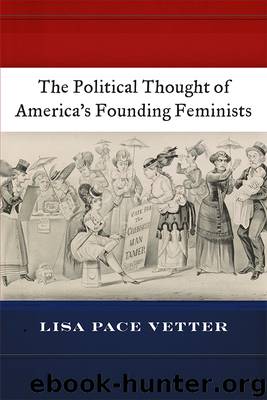The Political Thought of America's Founding Feminists by Vetter Lisa Pace;

Author:Vetter, Lisa Pace;
Language: eng
Format: epub
Tags: POL000000 Political Science / General
Publisher: New York University Press
“Truth for Authority, Not Authority for Truth”: Mott’s Antidogmatic Worldview
The phrase “truth for authority, not authority for truth,” one of Mott’s favorites, is borrowed from a rather unlikely source, Thomas Hobbes. The saying succinctly captures the spirit of Mott’s systematic attack on ideology, doctrine, and dogma and her insistence on independent reflection and freethinking. The origins of Mott’s antidogmatism can be traced to her early encounter with Elias Hicks, whose influence led to the 1827 Schism of the Society of Friends. Combatting what he perceived as an overreliance by worshippers on the scriptural interpretations of Quaker elites and an undue reverence for the written word at the expense of good works, Hicks sought to reassert the importance of direct, individual encounters with scriptural teachings and the necessity of actively applying religious principles to everyday life. Concurrent with the Hicksite emphasis on practice over principle is a downplaying, and in more radical circles an outright denial, of the divinity of Christ. Hicks also strove to reestablish the prominence of the inner light in Quaker practice, a kind of internal voice possessed by all human beings regardless of religious persuasion that nevertheless provides a direct connection to the divine. The Quaker understanding of corporate witness and collective discernment, discussed in chapter 4, which rely on the inner light, shows “an indwelling spirit working through individuals toward provisional truths” that were always subject to scrutiny and correction. The inner light can emerge when human beings engage in quiet reflection, hence the term “quietism” to describe the phenomenon. However, “since God [is] a divine force within humans rather than a heavenly force acting on them,” the inner light can also emerge when people engage in good acts, such as advocating for equality and justice for all people. Thus for Quakers, “a true love for oneself [is], in effect, a love of the divine urgings within oneself toward the self and others.”23 The Hicksite understanding required active engagement and reasoning, not passive obedience to the word of God. Hicksites discouraged formal worship of the Sabbath in favor of encouraging, as Jesus did, good works at every opportunity, not just on high days and holy days.
Hicks influenced a number of early women’s rights activists and abolitionists. Like the Grimkés, Mott innovates by taking what is primarily a religious approach and expanding it in several directions, including the political. The development and expansion of Mott’s antidoctrinal approach can be seen in her earliest speeches. Virtually every speech Mott delivered after returning from the 1840 World’s Anti-Slavery Convention in London, where she first encountered Stanton, and leading up to the 1848 Seneca Falls Convention, begins with a systematic condemnation of mindless acceptance of religious dogma and unreflective observance of rituals and practices. While commentators have traditionally recognized little notable activity among early women’s rights activists before 1848, these speeches reveal that Mott was formulating a comprehensive worldview that contributed significantly to the movement’s progress.
In an 1841 speech, Mott lays the foundation for her antidogmatic approach. She begins by forging a strong connection between truth, freedom, and independent thought.
Download
This site does not store any files on its server. We only index and link to content provided by other sites. Please contact the content providers to delete copyright contents if any and email us, we'll remove relevant links or contents immediately.
The Secret History by Donna Tartt(19053)
The Social Justice Warrior Handbook by Lisa De Pasquale(12187)
Thirteen Reasons Why by Jay Asher(8893)
This Is How You Lose Her by Junot Diaz(6877)
Weapons of Math Destruction by Cathy O'Neil(6265)
Zero to One by Peter Thiel(5786)
Beartown by Fredrik Backman(5737)
The Myth of the Strong Leader by Archie Brown(5500)
The Fire Next Time by James Baldwin(5431)
How Democracies Die by Steven Levitsky & Daniel Ziblatt(5215)
Promise Me, Dad by Joe Biden(5141)
Stone's Rules by Roger Stone(5081)
A Higher Loyalty: Truth, Lies, and Leadership by James Comey(4954)
100 Deadly Skills by Clint Emerson(4921)
Rise and Kill First by Ronen Bergman(4779)
Secrecy World by Jake Bernstein(4741)
The David Icke Guide to the Global Conspiracy (and how to end it) by David Icke(4708)
The Farm by Tom Rob Smith(4502)
The Doomsday Machine by Daniel Ellsberg(4484)
